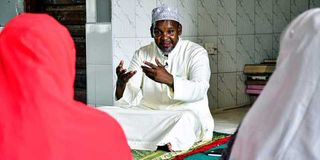Working with men, boys sure way to eradicate FGM ‘cut’ from world

Sheikh Abdullah Haji Gudo, the Council of Imams and Preachers of Kenya (CIPK) chairman, speaks at Masjid Rahma Mosque, Tana River County, on February 2 about his anti-FGM activities.
Today is the International Day of Zero Tolerance for Female Genital Mutilation. It is an important day for anti-FGM advocates, women and girls who live in communities that practise the ‘cut’.
The Kenya Demographic and Health Survey 2022 report shows female genital mutilation and cut (FGM/C) has been performed on 15 per cent of women aged 15-49—yet the vice was criminalised by the Prohibition of Female Genital Mutilation Act, 2011.
My interactions with communities from a wide range of cultures and women and girls who have faced the cut have led me to make a personal, fervent commitment to end this retrogressive practice. For the past eight months, my work has revolved around leading a team in designing and executing a programme aimed at ending FGM/C.
Imagine being born in a community that is marginalised, sparsely populated and has a wanting infrastructure. Your screams of pain can hardly be heard. Apart from how your family and community socialise you, you are unaware of anything else.
You are born into a sizable abstract entity which has its own distinct values, customs and beliefs, all of which you are not permitted to question—lest you are viewed as a rebel and harshly punished.
For a girl who lives in a community where FGM/C is common, the context is familiar. Sadly, despite the progress against the practice, there are parents and communities with no regard for their girls and women and only see them worthy of marriage, which is often forced on them—a violation of their rights.
A game changer in the war against FGM/C has been enlisting men and boys as allies. They play a significant role in perpetuating the practice—through either perpetrating or supporting it through cultural and social norms. The call for male participation and involvement in the anti-FGM/C war has made it to this year’s global theme for this day: “Partnership with men and boys to transform social and gender norms to end FGM”.
Equality and respect
Engaging men and boys is good progress in establishing and strengthening solidarity in established systems to end FGM/C. While that is key to ending the practice, it is important to approach this engagement in a manner that does not reinforce toxic masculinity or perpetuate negative gender stereotypes. Instead, the focus should be on promoting equality and respect for the human rights of all.
I have experienced situations where anti-FGM/C campaigns took the approach of seeking sympathy from men, in that they pleaded to stop FGM/C. Men should recognise FGM/C and, by extension, child and forced marriage as violence against women and girls (VAWG ) and show support for it.
As organisations and governments focus on investing in the participation f men and boys, the focus should be on girls and women. There is progress in empowering girls but we are far from the goal. Ending FGM/C is a sine qua non for an enabling environment for girls to access education and advocate public services.
There is a need to invest in education, water and health facilities among other infrastructure. Most of the hard-to-reach areas which are FGM/C hot spots have limited or no access to basic amenities. Prioritise investing in them.
The men supporting girls and women in anti-FGM/C programmes should let them lead their design and implementation. I have been in situations where, when men are brought on board, they take over the initiatives and barely involve the women and girls.
Men have also suggested the dismissal of long-existing womens’ rights networks established in communities through development programmes, claiming to have better ideas. Put up straightforward boundaries; failure to do so could result in resource manipulation and the weakening of the effective structures put in place by women to prevent VAWG in all its manifestations. Men should focus on supporting and collaborating with women.
The excuse of men perpetuating harmful practices because of a culture they’re raised in doesn’t wash. When you’re young, adults make decisions for you; as you get older, you develop your own beliefs and values. Men must take responsibility and think for themselves. FGM/C is violence and compromises human dignity, that of girls and women.
Ms Warui is a gender and development expert. [email protected].




